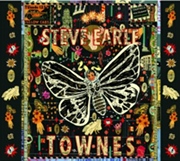- Alt-country/Americana
- 2009
- Buy the CD
Reviewed by Lee Zimmerman
So it’s somewhat comforting to find Earle essentially returning to his roots, retracing the songs of his friend and early mentor Townes Van Zandt, the troubled singer/songwriter who not only inspired Earle in his early days but also wrote several songs that still remain essential additions to Earle’s repertoire. The two men met at a club called the Old Quarter in Houston, and for several years they pursued parallel trajectories, building reputations as among the more prolific songsmiths of the booming alt-country movement while also battling substance abuse and their own inner demons. When Van Zandt died on January 1, 1997, Earle assumed a role as his heir apparent, preserving his spirit through troubled tales and a hard-bitten, bittersweet sound borne from difficulty and disillusionment. Not surprising from a man who named his son Justin Townes Earle in his friend’s honor and willingly took on the responsibility for keeping his legacy alive.
Justin duets with his dad on "Mr. Mudd and Mr. Gold," a tangled tune that spews a mouthful of lyrical twists in scarcely over two minutes of tune time, an apt example of the elder Earle’s determination to do justice to the material at hand. Earle strips these songs down to their unadorned essence, rendering them in the stark acoustic style that Townes himself purveyed in concert. His vocals are as tattered and frayed as Townes’ singing in the original readings, attaching a scarred poignancy to such sentimental standouts as "Pancho and Lefty," "No Place to Fall" and "To Live Is to Fly." Other tracks defer to rootsier realms, as conveyed through the folk-like longing of "Colorado Girl," the slapdash blues of "Where I Lead Me" and "Brand New Companion," and the restless heartland croon of "Delta Morning Blues" and "Loretta." Earle sings these songs with an intimacy and understanding that could only come from a genuine connection to the man and his material.
Tribute albums aren’t uncommon, of course, and most are spurred more by homage than ambition. But Townes is a rare breed, one where credibility actually counts. A rare reconvening of two kindred spirits, it spotlights the heart and soul of two uncommon artists.
You can follow us on Twitter and Facebook for content updates. Also, sign up for our email list for weekly updates and check us out on Google+ as well.













